In 2019 I challenged myself to read a book a week – and hit 52. In 2020, I managed more than 70. I’m looking forward to trying to match that in 2021!
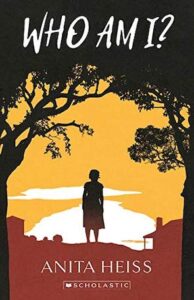 My first read for the year was Who Am I? by Anita Heiss, which is heartbreakingly sad, incredibly moving, yet ultimately filled with a little hope. Set in the 1930s, ten-year-old Mary Talance is a member of the Stolen Generations, like Anita’s grandmother, and so many others. The government policy of taking Aboriginal children from their parents then changing names and lying to everyone so they couldn’t find each other again is a horrifying, shameful and disturbing part of our history. It’s a terrible injustice, which still affects people today, and has been hidden away for far too long. Falsely justified for far too long. This book, and others, such as Archie Roach’s haunting memoir, are vitally important, so that we all know and understand what happened in the past, so it will never happen again. So we can try to understand the intergenerational trauma that still affects First Nations people.
My first read for the year was Who Am I? by Anita Heiss, which is heartbreakingly sad, incredibly moving, yet ultimately filled with a little hope. Set in the 1930s, ten-year-old Mary Talance is a member of the Stolen Generations, like Anita’s grandmother, and so many others. The government policy of taking Aboriginal children from their parents then changing names and lying to everyone so they couldn’t find each other again is a horrifying, shameful and disturbing part of our history. It’s a terrible injustice, which still affects people today, and has been hidden away for far too long. Falsely justified for far too long. This book, and others, such as Archie Roach’s haunting memoir, are vitally important, so that we all know and understand what happened in the past, so it will never happen again. So we can try to understand the intergenerational trauma that still affects First Nations people.
The diary format of this book is engaging and insightful, and having a young MC is perfect. There is so much wisdom and innocence in Mary’s genuine confusion at what has happened to her. At the terrible, confusing situations that make no sense at all. Why has her name been changed again? Why doesn’t her mother love her any more? Why is the school bully so cruel to her, just because of the colour of her skin? And beneath it all, who is she? I wish this was required reading for everyone, from politicians and law makers to school students and the rest of the population. There’s also a beautiful TED talk by author Anita Heiss here.
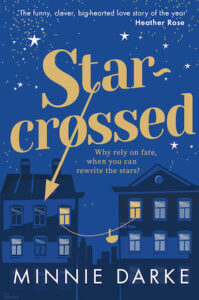 My second book of 2021 was Star-Crossed by Minnie Darke, a sweet, smart, funny story of love, friendship, scepticism, trust, and the intersection between them all. I loved endearing MC Justine, a hardworking and dedicated aspiring journo who embraces her flaws – although I did scream “No no no, please don’t do it!” once or twice. She’s a vintage-clothes-loving stealth grammar cop and an astrology sceptic, so when she runs into her first love, who’s returned to Melbourne and lives his life by the horoscopes in the magazine she works for, she figures a little tweaking of his stars won’t hurt. She’s only encouraging him to follow his heart and his dreams, right? Supporting him in a way his girlfriend does not? But Nick isn’t the only one who lives his life by this astrologer’s predictions, and sprinkled throughout the book are lots of vignettes of the other people impacted by Justine’s edits, some happy, some sad, some hilarious, all touching. There’s a slight nod to Love, Actually in the magical way the lives of all these strangers weave together by the end, and while Justine and Nick are at the heart of it, the many other characters are all vividly brought to life so you care about them too.
My second book of 2021 was Star-Crossed by Minnie Darke, a sweet, smart, funny story of love, friendship, scepticism, trust, and the intersection between them all. I loved endearing MC Justine, a hardworking and dedicated aspiring journo who embraces her flaws – although I did scream “No no no, please don’t do it!” once or twice. She’s a vintage-clothes-loving stealth grammar cop and an astrology sceptic, so when she runs into her first love, who’s returned to Melbourne and lives his life by the horoscopes in the magazine she works for, she figures a little tweaking of his stars won’t hurt. She’s only encouraging him to follow his heart and his dreams, right? Supporting him in a way his girlfriend does not? But Nick isn’t the only one who lives his life by this astrologer’s predictions, and sprinkled throughout the book are lots of vignettes of the other people impacted by Justine’s edits, some happy, some sad, some hilarious, all touching. There’s a slight nod to Love, Actually in the magical way the lives of all these strangers weave together by the end, and while Justine and Nick are at the heart of it, the many other characters are all vividly brought to life so you care about them too.
The audiobook is wonderfully narrated by Australian actor Arianwen Parkes-Lockwood, and it’s a beautifully written book (Minnie is a pen name of literary novelist Danielle Wood, whose books I’ll check out at some point). Moving, clever and witty, it’s a charming read about love, chance, destiny, and the choices we make, or refuse to.
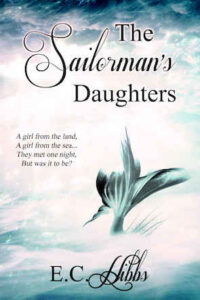 January’s faery tale is The Little Mermaid, so I’ve been diving in to a few mer-tales. I loved The Sailorman’s Daughters by E. C. Hibbs (3 of 52), where myth and magic blend with the real world, and a lonely young girl in a small Cornish fishing village discovers that some legends are true, and friendship can bloom in the strangest of circumstances… For #grababook, the third line on page 21: “Florence hadn’t been lying or spouting nonsense after all! There were mermaids!” I also love the tagline: A girl from the land, A girl from the sea… They met one night, but was it to be? And I loved Emma’s book Blindsighted Wanderer too…
January’s faery tale is The Little Mermaid, so I’ve been diving in to a few mer-tales. I loved The Sailorman’s Daughters by E. C. Hibbs (3 of 52), where myth and magic blend with the real world, and a lonely young girl in a small Cornish fishing village discovers that some legends are true, and friendship can bloom in the strangest of circumstances… For #grababook, the third line on page 21: “Florence hadn’t been lying or spouting nonsense after all! There were mermaids!” I also love the tagline: A girl from the land, A girl from the sea… They met one night, but was it to be? And I loved Emma’s book Blindsighted Wanderer too…
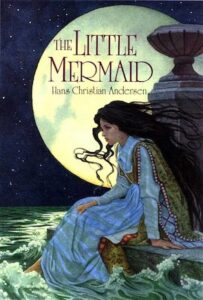 This month’s Australian Fairy Tale Society story is The Little Mermaid by Danish writer Hans Christian Andersen (4 of 52), a literary faery tale first published in 1837 – and I’d forgotten how depressing it is! Not just with the cutting out her tongue and each step being like dancing on knives (which is bad enough!), but the Prince making her sleep on the floor outside his door like a dog, and regaling her with tales of why he can’t love her. Not to mention her giving up her voice, her tail, her family, her 300 years, her *life*, for a guy she’d glimpsed a few times and could never speak to! But this book pretty much created the modern mermaid story, and has inspired hundreds since, and Charles Santore’s illustrations in this edition are so so beautiful.
This month’s Australian Fairy Tale Society story is The Little Mermaid by Danish writer Hans Christian Andersen (4 of 52), a literary faery tale first published in 1837 – and I’d forgotten how depressing it is! Not just with the cutting out her tongue and each step being like dancing on knives (which is bad enough!), but the Prince making her sleep on the floor outside his door like a dog, and regaling her with tales of why he can’t love her. Not to mention her giving up her voice, her tail, her family, her 300 years, her *life*, for a guy she’d glimpsed a few times and could never speak to! But this book pretty much created the modern mermaid story, and has inspired hundreds since, and Charles Santore’s illustrations in this edition are so so beautiful.
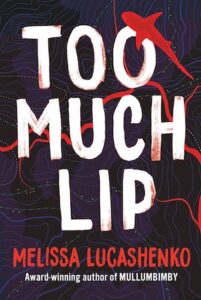 I really loved Too Much Lip by Melissa Lucashenko (5 of 52) – definitely a five-star read, and a worthy Miles Franklin Award winner. It’s harrowing and heartbreaking, although there are some moments of levity and joy amidst the violence and pain and suffering, and by the end, some redemption, forgiveness, and even a little hope. It’s not an easy read (or listen), but it shouldn’t be. Australia has a terrible history of invasion, colonisation and domination over the First Australians, which so many people (and politicians) still refuse to acknowledge, to our continuing shame. Trauma from past generations is still felt by so many First Nations people, and terrible injustices continue today. And while this book is fiction, every incident in it is based on fact, either from the author’s own family, or the historical record, which makes it even more moving, and devastating. But there’s no simplified “white people are all villains” or “Indigenous people are all faultless”. Each character is complex and multi-layered, and has done good and bad, sometimes for the right reasons, sometimes not. I don’t want to go into the plot too much, because I read a few reviews when I started it, and saw some unfortunate spoilers, but there’s family drama, a little crime, a big mystery, a legal case, a lot of perceptions challenged by all concerned, and a beautiful thread of connection to Country that gives the book its beating heart.
I really loved Too Much Lip by Melissa Lucashenko (5 of 52) – definitely a five-star read, and a worthy Miles Franklin Award winner. It’s harrowing and heartbreaking, although there are some moments of levity and joy amidst the violence and pain and suffering, and by the end, some redemption, forgiveness, and even a little hope. It’s not an easy read (or listen), but it shouldn’t be. Australia has a terrible history of invasion, colonisation and domination over the First Australians, which so many people (and politicians) still refuse to acknowledge, to our continuing shame. Trauma from past generations is still felt by so many First Nations people, and terrible injustices continue today. And while this book is fiction, every incident in it is based on fact, either from the author’s own family, or the historical record, which makes it even more moving, and devastating. But there’s no simplified “white people are all villains” or “Indigenous people are all faultless”. Each character is complex and multi-layered, and has done good and bad, sometimes for the right reasons, sometimes not. I don’t want to go into the plot too much, because I read a few reviews when I started it, and saw some unfortunate spoilers, but there’s family drama, a little crime, a big mystery, a legal case, a lot of perceptions challenged by all concerned, and a beautiful thread of connection to Country that gives the book its beating heart.
It’s full of strength and beauty, and the things that separate as well as those that bind us all together. The deep connection to family and Country of many of the characters is incredibly moving, and stayed with me long after I finished. And it’s beautifully written, parts dark humour and restrained fury, part historical record and even a touch of magical realism, and it brings the Bundjalung Country of northern NSW vividly to life, both the land and the animals a big part of the story, and characters in their own right. Bundjalung words are scattered throughout too, which adds another layer, and the audiobook is beautifully narrated by Tamala Shelton, a Bundjalung-Lamalama woman who narrates with passion and warmth, and inhabits each character perfectly. This is a compelling story that all Australians should read – and people from other countries would love too.
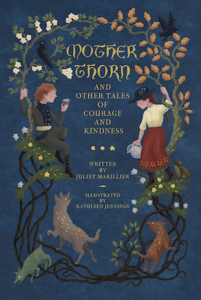 It’s always exciting when my favourite author releases a new book, and I adore Juliet Marillier’s latest release, Mother Thorn and Other Tales of Courage and Kindness (6 of 52), a wonderful collection of faery tales. The four short stories are beautifully written, filled with magic and wonder, kindness and courage, pots of tea, kitchen witchery and enchanted (and enchanting) creatures, and battles, soul mates, and beings from the Otherworld. Second chances, hard-won wisdom, and Juliet’s devotion and care for her much-loved rescue dogs are also woven throughout these charming stories. Three are inspired by existing faery tales – The Well of the World’s End, The Princess and the Pea, and The Tinder Box – but they are completely reimagined, and far more poignant and moving for it. The fourth is built around a snippet of folklore, and is just gorgeous. They all celebrate courage and kindness, and are about being true to yourself, discovering your inner strength, and recognising the good in others. It’s beautifully illustrated by Kathleen Jennings, and the stunning hardcover is available now from Serenity Press, and will be released more widely in April.
It’s always exciting when my favourite author releases a new book, and I adore Juliet Marillier’s latest release, Mother Thorn and Other Tales of Courage and Kindness (6 of 52), a wonderful collection of faery tales. The four short stories are beautifully written, filled with magic and wonder, kindness and courage, pots of tea, kitchen witchery and enchanted (and enchanting) creatures, and battles, soul mates, and beings from the Otherworld. Second chances, hard-won wisdom, and Juliet’s devotion and care for her much-loved rescue dogs are also woven throughout these charming stories. Three are inspired by existing faery tales – The Well of the World’s End, The Princess and the Pea, and The Tinder Box – but they are completely reimagined, and far more poignant and moving for it. The fourth is built around a snippet of folklore, and is just gorgeous. They all celebrate courage and kindness, and are about being true to yourself, discovering your inner strength, and recognising the good in others. It’s beautifully illustrated by Kathleen Jennings, and the stunning hardcover is available now from Serenity Press, and will be released more widely in April.
I counted all four of these as one book, so I’m not cheating on my book-a-week challenge!
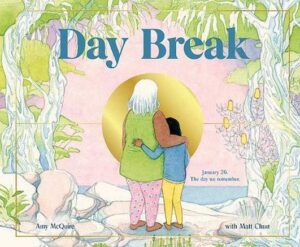 Day Break by Amy McQuire (7a of 52) is a beautiful and timely picture book for children – which will touch the hearts of adults too (I bought it for me J ). Australia has a brutal history of invasion, land theft, stolen children and genocide, and many First Nations people still suffer from intergenerational trauma and systemic racism, and the impact of more than two hundred years of violence, dispossession, and denial of their existence and their most basic rights. This is why an increasing number of people, Indigenous and non-Indigenous, don’t find Australia Day a time of celebration – to too many it is Invasion Day, Survival Day, a Day of Mourning… This gorgeous book has simplified the complexity of the ongoing debate with empathy, strength and hope, focusing on the connection of First Nations people to family, ancestors and Country. Beautifully illustrated by Matt Chun, it is a heartfelt, touching story that provides insight and understanding, and will hopefully encourage conversation as well as action. It’s time for #truthtelling.
Day Break by Amy McQuire (7a of 52) is a beautiful and timely picture book for children – which will touch the hearts of adults too (I bought it for me J ). Australia has a brutal history of invasion, land theft, stolen children and genocide, and many First Nations people still suffer from intergenerational trauma and systemic racism, and the impact of more than two hundred years of violence, dispossession, and denial of their existence and their most basic rights. This is why an increasing number of people, Indigenous and non-Indigenous, don’t find Australia Day a time of celebration – to too many it is Invasion Day, Survival Day, a Day of Mourning… This gorgeous book has simplified the complexity of the ongoing debate with empathy, strength and hope, focusing on the connection of First Nations people to family, ancestors and Country. Beautifully illustrated by Matt Chun, it is a heartfelt, touching story that provides insight and understanding, and will hopefully encourage conversation as well as action. It’s time for #truthtelling.
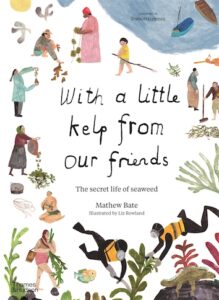 With a Little Kelp from Our Friends: The Secret Life of Seaweed by Mathew Bate (7b of 52) is a gorgeous book, funny, fascinating, beautifully illustrated by Liz Rowland, and huge too – it’s a 35cm-tall, colourful hardcover you’ll want to treasure. It’s a celebration of the fact that scientists are discovering that seaweed is a climate-change superhero that will play a vital role in saving our precious planet. To many people this unassuming, sometimes-slimy algae is just a weed – but it can help stop global warming and remove carbon from the atmosphere, be eaten (it’s one of the most nutritious foods on the planet!), used as medicine, made into clothes, edible plastics and fuel for cars – and can even be fed to cattle to reduce their methane emissions, which is brilliant because each cow burps and farts around 300 litres of methane every day – one of the worst contributors to global warming. Filled with fascinating facts, activities, craft, tips, history, mythology, a seaweed guide, glossary and even a recipe, this book is a beautiful love letter to the unsung hero of the seas, and will inspire people to respect and protect the natural world, and appreciate just how seriously cool seaweed is!
With a Little Kelp from Our Friends: The Secret Life of Seaweed by Mathew Bate (7b of 52) is a gorgeous book, funny, fascinating, beautifully illustrated by Liz Rowland, and huge too – it’s a 35cm-tall, colourful hardcover you’ll want to treasure. It’s a celebration of the fact that scientists are discovering that seaweed is a climate-change superhero that will play a vital role in saving our precious planet. To many people this unassuming, sometimes-slimy algae is just a weed – but it can help stop global warming and remove carbon from the atmosphere, be eaten (it’s one of the most nutritious foods on the planet!), used as medicine, made into clothes, edible plastics and fuel for cars – and can even be fed to cattle to reduce their methane emissions, which is brilliant because each cow burps and farts around 300 litres of methane every day – one of the worst contributors to global warming. Filled with fascinating facts, activities, craft, tips, history, mythology, a seaweed guide, glossary and even a recipe, this book is a beautiful love letter to the unsung hero of the seas, and will inspire people to respect and protect the natural world, and appreciate just how seriously cool seaweed is!
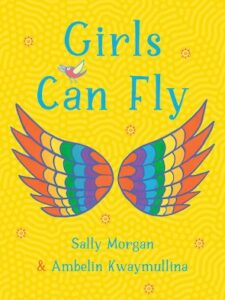 Girls Can Fly by Sally Morgan and Ambelin Kwaymullina (7c of 52) is an inspirational young teen book, from award-winning Aboriginal writer and artist Sally Morgan and her equally talented writer, artist and law academic daughter Ambelin. It’s vividly illustrated and full of wonderful advice, which combines to make a beautiful, thoughtful and encouraging book, and a perfect gift. Shout out too for Sally’s classic memoir My Place, in either the classic or younger reader versions, and Ambelin’s powerful verse novel Living On Stolen Land. And her novel The Interrogation of Ashala Wolf is on my tbr pile.
Girls Can Fly by Sally Morgan and Ambelin Kwaymullina (7c of 52) is an inspirational young teen book, from award-winning Aboriginal writer and artist Sally Morgan and her equally talented writer, artist and law academic daughter Ambelin. It’s vividly illustrated and full of wonderful advice, which combines to make a beautiful, thoughtful and encouraging book, and a perfect gift. Shout out too for Sally’s classic memoir My Place, in either the classic or younger reader versions, and Ambelin’s powerful verse novel Living On Stolen Land. And her novel The Interrogation of Ashala Wolf is on my tbr pile.
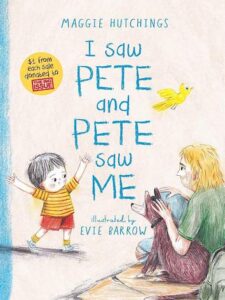 I Saw Pete and Pete Saw Me by Maggie Hutchings (7d of 52) is a beautiful, moving story told from a child’s perspective, about the complex issue of homelessness. While adults are often too busy to notice the people they walk past, children have the capacity to care, and to remind us of what is important. It’s beautifully illustrated by Evie Barrow, and sensitively written, and will hopefully open up conversations with young people, and with older ones too! There’s no easy solution, but this book provides hope and encourages empathy and kindness, and is a beautiful reminder of the capacity of children to understand more than they’re given credit for.
I Saw Pete and Pete Saw Me by Maggie Hutchings (7d of 52) is a beautiful, moving story told from a child’s perspective, about the complex issue of homelessness. While adults are often too busy to notice the people they walk past, children have the capacity to care, and to remind us of what is important. It’s beautifully illustrated by Evie Barrow, and sensitively written, and will hopefully open up conversations with young people, and with older ones too! There’s no easy solution, but this book provides hope and encourages empathy and kindness, and is a beautiful reminder of the capacity of children to understand more than they’re given credit for.
The author says: “The truth is hard-edged; there are no unicorn solutions for homelessness – but standing by and doing nothing isn’t an option. I am hopeful that by opening up conversations in homes, schools and communities, seeds of change will be sewn in small minds.”
A dollar from each sale is being donated to the wonderful The Big Issue, which provides work and income for homeless, marginalised and disadvantaged people. I also love Orange Sky Laundry, which offers a much-needed service for the homeless by providing free washing and shower facilities as well as conversation and caring.
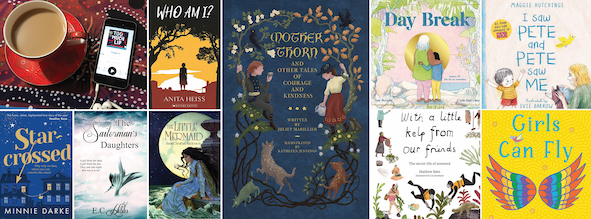


Get Social